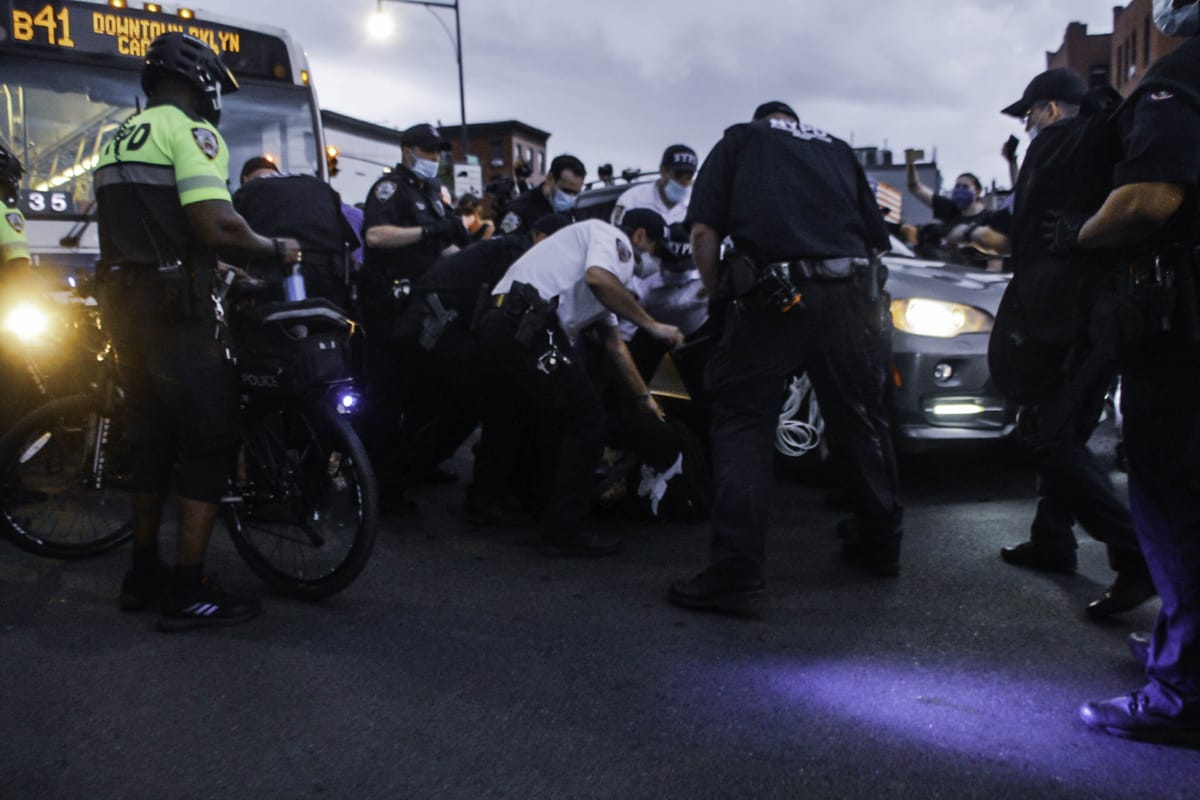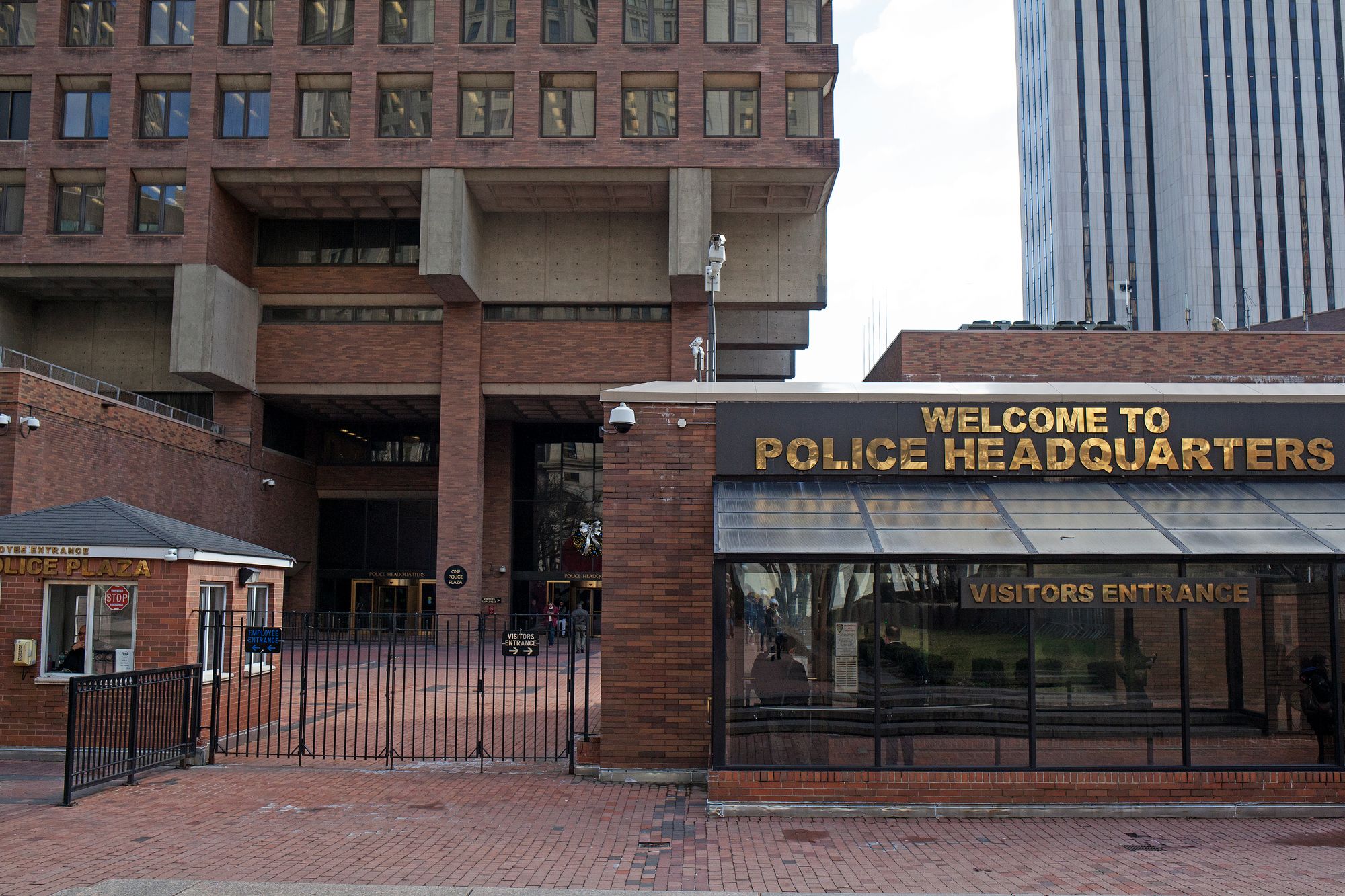Scores Arrested Amid Floyd Protests Locked Up for More Than 24 Hours in NYC: Lawsuit


Rosa Goldensohn, Claudia Irizarry Aponte, and Reuven Blau, originally published in THE CITY
More than 100 people arrested amid weekend protests and unrest have spent over 24 hours behind bars in Manhattan without seeing a judge, according to a Legal Aid Society lawsuit demanding their release.
Defendants say they were left waiting for hours in packed holding areas at police headquarters with fellow demonstrators amid the pandemic.
“Nobody was wearing masks inside One Police Plaza,” said one man locked up Friday night. “So that was super dangerous.”

The New York City Police Department has arrested an estimated 1,500 people over several days of demonstrations and nights of disturbances following the killing of a black man, George Floyd, by police in Minneapolis.
At least 700 were arrested on Monday amid what police said were spates of looting. As of Tuesday afternoon, more than 400 people awaited arraignment in Manhattan, according to the Office of Court Administration.
A 1991 court case requires that people arrested in New York City must see a judge within 24 hours. Before arraignment, arrestees without their own lawyer have to be assigned to public defenders.
Defense attorneys say they do not yet know where their would-be clients are being held or how many are in hospitals.
“The reason why 24 hours from arrest to arraignment is important, besides the fact that somebody has a right to that due process, is [so] that people don’t fall through the cracks,” said Tina Luongo, Legal Aid’s criminal practice attorney-In-charge. “There’s a process that the time pressure allows the people to not languish in the holes and the cracks of the criminal justice system.”
Justice Wheels Turn Slowly
Because of COVID-19, the criminal courts have moved to a virtual process. Only a clerk and court officer are physically in the courtroom. Defendants appear via video feed from the lockup in Central Booking, and judges and lawyers videoconference in from home or the office.
Lucian Chalfen, a courts spokesperson, said that the NYPD’s slow pace of filing information for criminal complaints — not the remote system — is causing the delays.
“To docket the case and arraign someone, the court needs the arrest paperwork to be processed, which the Police Department is doing glacially,” Chalfen told THE CITY Tuesday.
Officials added an extra virtual courtroom to cope with the hundreds of arrestees awaiting arraignment, many for burglary charges stemming from alleged looting, Chalfen said.
“Everything is f—-d up,” said Dennis Quirk, president of the New York State Court Officers’ Association.
“They made so many arrests,” Quirk said. “There’s definitely a backlog. They have to wait until the arresting cop signs off.”
The NYPD did not immediately respond to a request for comment.
‘You’re Just Disappeared’
People who spent time locked up in One Police Plaza described a dismal scene inside.
One man, who requested anonymity, said he was arrested in Midtown shortly after 11 p.m. Monday while looking for a friend. He was released from police headquarters at 6 a.m. with a court appearance ticket for illegal assembly.
He spent the intervening seven hours, he said, in a cramped holding area with 30 other men, some young as 18. He described seeing an asthmatic man beg for an inhaler to no avail, another man with a leg wound wail for hours before being transported to a hospital, and others with tear gas still stinging their eyes plead for water.
It was the first night he participated in the citywide protests — and it might be his last.
“With the new curfew? I wouldn’t protest again, after what I just saw,” he said.
He said cops did not read him his Miranda rights, tell him why he was arrested, or give him the opportunity to call an attorney.
“It’s definitely not a proper due process. It’s literally like ‘Yo, we’re arresting you whether you know what’s going on or not,’” he said of his experience. “You’re just disappeared.”
Fear for Health
Another man, who asked to be identified as Johnathan, spent Friday night at One Police Plaza after climbing atop a subway station entrance in Brooklyn to record video.
He said conditions in lockup felt dangerous given coronavirus, with 30 to 40 other protest attendees in a windowless room and police inside not wearing masks.
Johnathan, who is HIV-positive, began to feel dizzy after returning and fears he contracted the virus in those hours inside.
“Now I’m much more concerned about my health,” he said.
When he was finally released Saturday, he was met with cheers from volunteers giving out water and food.
“If I live through this, next time I have to be there to help the people get out, or welcome them out,” he said.
THE CITY is an independent, nonprofit news outlet dedicated to hard-hitting reporting that serves the people of New York.




